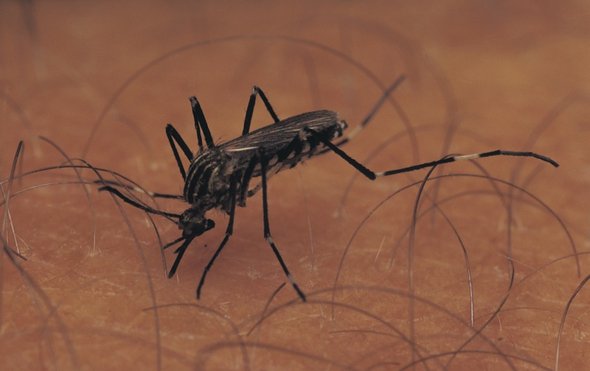(单词翻译:单击)
听力文本
This is Scientific American — 60-Second Science. I'm Karen Hopkin.
When it comes to sucking blood, mosquitos can play favorites: they show preferences for particular species or even certain individuals. At the same time, their tastes can change, depending on the circumstances. One species of skeeter in California, for example, has a fondness in summer for robins, but will settle for mammals once the birds head south for the winter.
But how do mosquitoes decide what's on the menu? And when to shift to something new? It appears that they play it by nose—and by their intended victim's behavior. Because a new study shows that mosquitoes not only memorize the scent of their preferred host, they can use these olfactory cues to avoid individuals who try to swat them. The finding is in the journal Current Biology.
Researchers took female mosquitoes of the species Aedes aegypti and loaded them one by one into a maze shaped like a Y. One arm of the Y was suffused with the scent of a human volunteer. The other contained a control solution of mineral oil. As predicted, the mosquitoes showed an obvious preference for eu d' Homo sapiens.

Next, the researchers attempted to train the mosquitoes to flee from the heady aroma of humans. So they coupled the exposure to human odor with a mechanical vibration—something akin to the shock that might accompany a near-miss by a swatting host. Sure enough, mosquitoes that were trained to associate human smells with their potentially deadly defensive maneuvers lost their appetite for the previously attractive scent.
That learning, the researchers found, is made possible by the neurotransmitter dopamine. This biological chemical has previously been shown to play a role when female mosquitoes seek someone to suck. And it's involved in learning and memory in other insects.
So the researchers used an array of molecular techniques to knock out the aegypti's ability to sense and respond to dopamine. And without this neurotransmitter, mosquitoes become much worse at learning to avoid danger.
Targeting mosquitoes' smarts could thus provide a new method for curbing the spread of diseases carried by Aedis aegypti—like Zika, dengue, and yellow fever. Because mosquitoes that are slow learners (swatting/slap noise) are easier to swat.
Thanks for listening for Scientific American — 60-Second Science. I'm Karen Hopkin.
参考译文
这里是科学美国人——60秒科学。我是凯伦·霍普金。
说到吸血,蚊子可能有偏爱的目标:它们表现出了对特定物种甚至是特定个体的偏好。同时,蚊子的口味可能会随环境改变。举例来说,加利福尼亚州有一种蚊子,在夏天喜欢叮咬知更鸟,而在鸟儿飞往南方过多时,则会将就着吸食哺乳动物的血。
可是蚊子是如何决定吸血目标的呢?又会在何时转换目标?看起来蚊子是通过鼻子和预期受害者的行为来决定的。因为一项新研究显示,蚊子不仅能记住偏爱宿主的气味,还能利用这些嗅觉信息来避开想拍死它们的个体。这项研究结果发表在《当代生物学》期刊上。
研究人员将雌性埃及伊蚊放进一个Y型迷宫中。Y型迷宫其中一个分支充满了人类志愿者的气味。另一个则包含矿物油的对照溶液。正如预测的那样,蚊子表现出了对人类气味的明显偏爱。
接下来,研究人员试图训练蚊子逃离人类那令其沉迷的香气。因此,他们将“接触人类气味”和“机械振动”结合在一起,这种振动与宿主差点拍死蚊子的动作所产生的振动类似。果然,经过训练将人类气味与潜在致命防御机动关联在一起的蚊子,对此前吸引其的气味没了食欲。
研究人员发现,这种学习通过神经递质多巴胺来实现。这种生物化学物质此前曾被证明在雌性蚊子寻找吸血目标时发挥作用。另外这种物质还参与了其他昆虫的学习和记忆过程。
因此,研究人员用一系列分子技术,来去除埃及伊蚊对多巴胺的感知和反应能力。失去这种神经递质以后,蚊子学习躲避危险的能力被大大削弱。
因此,研究蚊子的智慧,可以为遏制寨卡病毒、登革热和黄热病等埃及伊蚊所携带疾病的扩散提供新方法。因为学习能力减弱的蚊子(拍打声/拍击声)更容易被打到。
谢谢大家收听科学美国人——60秒科学。我是凯伦·霍普金。
译文为可可英语翻译,未经授权请勿转载!
重点讲解
重点讲解:
1. when it comes to 谈到;涉及;
We seem to have completely lost the concept of correct timing when it comes to parties these days.
人们在参加聚会时,似乎完全丧失了正确的时间概念。
2. settle for 选择;(尤指)勉强接受,将就;
We reached the hotel late and had to settle for a room without a view.
我们到旅馆时已很晚,只好勉强要了一间看不到风景的房间。
3. be akin to 相似的;类似的;
This process is akin to piecing together a jigsaw puzzle.
这个过程和拼图相似。
4. sure enough 果真,果然(尤用在讲故事时) ;
I said he'd forget, and sure enough he did.
我说他会忘记,他果然就忘了。


